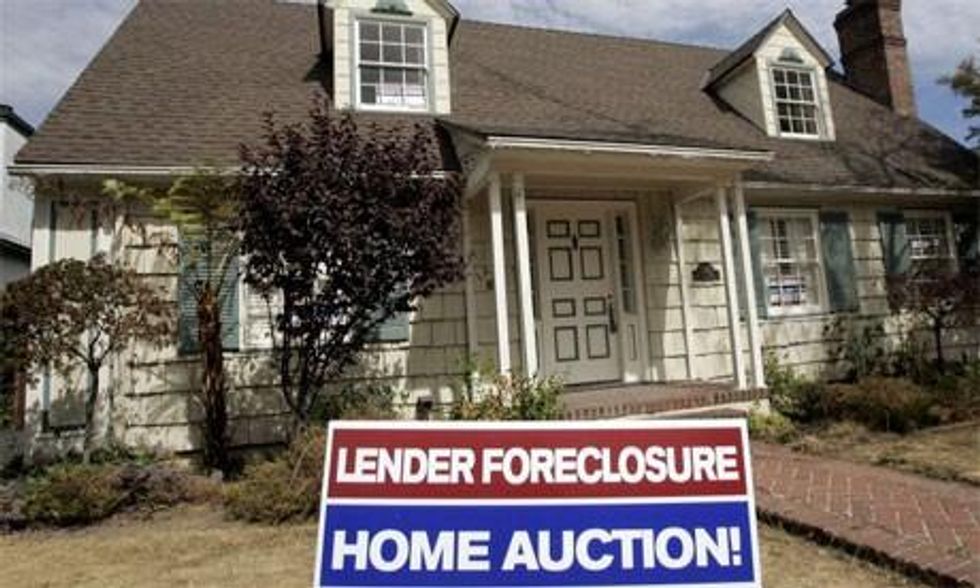A long string of socially costly misdeeds by major private US banks have been exposed since the current crisis hit in 2007. The latest concerns an obscure enterprise named Mortgage Electronic Registration Systems, or Mers.
Founded in 1995, this private company in Virginia never employed more than 50 people full-time. Big private banks (Bank of America, JP Morgan Chase, etc) and housing finance companies, like Fannie Mae and Freddie Mac, founded Mers in order to speed the processing of mortgages into mortgage-backed securities (MBS). Investors were willing to buy these new securities (bundles of Americans' mortgages). Most importantly, US financial institutions wanted the huge profits from producing and trading MBS.
Different local procedures for registering mortgages and processing the paperwork for trading mortgages had been slow and cumbersome across the US, but financial mega-corporations were impatient - so they created this fast, computerized way of registering mortgages and mortgage trades. Mers achieved its purpose during the housing boom that occurred from 1995 to 2007. But when mortgage defaults precipitated the housing crash and then broader economic crises, banks and lenders used Mers to foreclose on defaulted mortgages.
Mers, it now turns out, was lax and loose, as well as fast, in processing foreclosures. Beyond facilitating mortgage transactions, it often represented ultimate lenders (who alone can legally initiate foreclosures) whose exact identities were sometimes questionable. In so doing, Mers violated state laws that strictly regulate foreclosure procedures.
On 16 August 2012, the supreme court of Washington state voted unanimously that Mers had improperly initiated foreclosures on thousands of mortgages. Victims of such foreclosures can now contest them, and other states are moving to do likewise. The already badly depressed housing market has thus been dealt yet another blow - economic uncertainties multiply with the prospect of US courts becoming further clogged by litigation over these foreclosures.
The Mers mess created by profit-driven mega-banks is relatively small compared to the other disasters those banks have produced over the last five years. The large private banks were major players in aggressively promoting mortgages to millions who could not reasonably be expected to afford them. These financial institutions took extraordinary and excessive risks (often with other people's deposits) in the new MBS markets and their associated credit default swap markets. We know now that deals between the big banks and the rating companies (especially Moody's, Standard & Poor's and Fitch) wrongly inflated risk evaluations of those securities. We also know now that insurance mega-corporations (especially AIG) could not deliver the insurance protections they had sold to banks and other lenders when mortgages defaulted and MBS values dropped.
The private mega-banks' imprudent, often unethical and sometimes illegal activities were major causes of the global economic crisis since 2007.
Conventional economics teaches that banks are financial intermediaries. They connect those with money to save and lend - their depositors and investors - with people and businesses seeking to borrow: a vital economic function. As trustees of other people's money, they are expected to assess, carefully and prudently, the risks of lending that money. When borrowers default, lenders usually bear a significant part of the responsibility for failing to see, evaluate and avoid such loans. Borrowers, after all, are expected to over-value their projects, just as lenders are supposed to play the role of skeptical, diligent risk assessors. Collapsed global credit markets in 2008/2009 exposed the private mega-banks' colossal failures to perform that role.
In recent months, large US private banks and other mega-financial firms have been caught - and often fined millions - for still other misbehavior. They have, variously: imposed illegal extra fees and costs on customers; laundered money from illegal enterprises; and improperly pushed disastrous financial deals on budget-stressed city officials, as in Stockton, California. Last February, five major US banks agreed to pay $25bn to settle state and federal claims about their "questionable mortgage practices". Major banks will also soon face penalties for their roles in the Libor interest-rate manipulation scandal, exposed last summer.
These unethical and/or illegal and/or self-servingly incompetent actions by Big Finance have proven to be incredibly costly to the entire world economy. Private profit drove all these bank behaviors and, even when penalized, banks' fines were trivial compared to the profits those behaviors realized. Thus, they continue and extend the list of big private banks' misdeeds. The public fumes, the politicians hype new bank regulations, the courts impose fines ... and banks keep finding "new financial profit opportunities".
Big banks' failures raise an obvious question: can finance safely be left in their private hands? If any public enterprises displayed comparably awful records of misdeeds, demands to privatize them would be deafening. Yet, neoliberal economic fundamentalism keeps the reverse logic unspoken and, by many, unimagined. Instead, public money and Fed-lowered interest rates keep bailing out and subsidizing the same mega-banks that so grievously failed their economic function and the public's trust.
One obvious alternative to this deeply and repetitively dysfunctional private banking system is socialized banking. Once freed from neoliberal fundamentalism, the US could rationally debate and compare the costs and benefits of private versus socialized banks, and various possible mixtures of them. After all, the US has accumulated experience with the very different kind of banking represented by thousands of workplace and community credit unions. We can also draw upon North Dakota's success for decades with its state-owned bank. Other countries' experiences with public and publicly accountable financial enterprises can also help build better financial institutions than we have with big private banks. Another alternative would reorganize all banks into workers' self-directed enterprises, where workers and communities affected by bank policies together direct and operate banks.
To ignore alternatives to private mega-banks condemns us all to longer-lasting, more socially costly and recurring crises. That is the chief lesson of all the mega-banks' misdeeds - from misusing Mers to manipulating the Libor, to utterly inadequate risk assessments of the new century's financial markets.


